标签:
学完c++快一年了,感觉很有遗憾,因为一直没有感觉到c++的强大之处,当时最大的感觉就是这个东西的输入输出比C语言要简单好写。
后来我发现了qt,opencv,opengl,原来,c++好玩的狠。
在这些图形库之外,最常用的可能就是STL,这个东西由于当时学c++的时候迷迷糊糊,完全是一头雾水,上学期数据结构之后开始有点儿开窍了,现在把才c++STL中常用的函数,用法贴一下,也是记录一下,希望能给一样迷糊的盆友们一些帮助。
整理自《ACM程序设计》
迭代器(iterator)
个人理解就是把所有和迭代有关的东西给抽象出来的,不管是数组的下标,指针,for里面的、list里面的、vector里面的,抽象一下变成了iterator


求和(<numeric> accumulate)
accumulate(v.begin(),v.end(),0),把从 v.begin() 开始到 v.end()结束所有的元素加到 0上面去

1 #include <iostream> 2 #include <vector> 3 #include <numeric> 4 5 using namespace std; 6 7 int main() 8 { 9 vector<int> v; 10 for(int i = 0; i < 10; ++i ) 11 { 12 v.push_back(i); 13 } 14 for(vector<int>::iterator it = v.begin(); it != v.end(); ++it) 15 { 16 cout << *it << " "; 17 } 18 cout << endl; 19 cout << accumulate(v.begin(),v.end(),0) << endl; 20 return 0; 21 }

vector(动态数组)
vector有内存管理的机制,也就是说对于插入和删除,vector可以动态调整所占用的内存空间。
vector相关函数

1 #include <iostream> 2 #include <vector> 3 4 using namespace std; 5 6 int main() 7 { 8 vector<int> v; 9 v.push_back(3); //数组尾部插入3 10 v.push_back(2); 11 v.push_back(1); 12 v.push_back(0); 13 cout << " 下标 " << v[3] << endl; 14 cout << " 迭代器 " << endl; 15 for(vector<int>::iterator i = v.begin();i!= v.end();++i) 16 { 17 cout << *i << " "; 18 } 19 cout << endl; 20 //在第一个元素之前插入111 insert begin+n是在第n个元素之前插入 21 v.insert(v.begin(),111); 22 //在最后一个元素之后插入222 insert end + n 是在n个元素之后插入 23 v.insert(v.end(),222); 24 25 for(vector<int>::iterator i = v.begin();i!= v.end();++i) 26 { 27 cout << *i << " "; 28 } 29 cout << endl; 30 31 vector<int> arr(10); 32 for(int i = 0; i < 10; i++) 33 { 34 arr[i] = i; 35 } 36 for(vector<int>::iterator i = arr.begin();i!= arr.end();++i) 37 { 38 cout << *i << " "; 39 } 40 cout << endl; 41 42 //删除 同insert 43 arr.erase(arr.begin()); 44 45 for(vector<int>::iterator i = arr.begin();i!= arr.end();++i) 46 { 47 cout << *i << " " ; 48 } 49 cout << endl ; 50 51 arr.erase(arr.begin(),arr.begin()+5); 52 53 for(vector<int>::iterator i = arr.begin();i!= arr.end();++i) 54 { 55 cout << *i << " " ; 56 } 57 cout << endl ; 58 return 0 ; 59 }
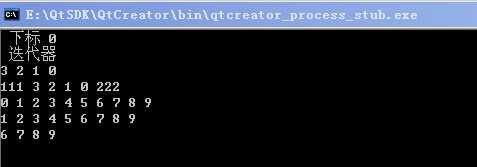
数组转置 (<algorithm> reverse)
reverse(v.begin(),v.end())

1 #include<iostream> 2 #include<vector> 3 #include<algorithm> 4 5 using namespace std; 6 7 int main() 8 { 9 vector<int> v; 10 for(int i = 0; i < 10; ++i) 11 { 12 v.push_back(i); 13 } 14 for(vector<int>::iterator it = v.begin(); it != v.end(); ++it) 15 { 16 cout << *it << " "; 17 } 18 cout << endl; 19 20 reverse(v.begin(),v.end()); 21 22 23 for(vector<int>::iterator it = v.begin(); it != v.end(); ++it) 24 { 25 cout << *it << " "; 26 } 27 cout << endl; 28 return 0; 29 }

排序(<algorithm> sort)
sort(v.begin(),v.end())

1 #include<iostream> 2 #include<vector> 3 #include<algorithm> 4 5 using namespace std; 6 7 bool Comp(const int &a,const int &b) 8 { 9 return a>b; 10 } 11 12 int main() 13 { 14 vector<int> v; 15 v.push_back(1); 16 v.push_back(3); 17 v.push_back(2); 18 v.push_back(55); 19 v.push_back(-1); 20 v.push_back(0); 21 v.push_back(2); 22 v.push_back(3); 23 v.push_back(4); 24 25 for(vector<int>::iterator it = v.begin(); it != v.end(); ++it) 26 { 27 cout << *it << " "; 28 } 29 cout << endl; 30 31 //默认升序 32 sort(v.begin(),v.end()); 33 34 35 for(vector<int>::iterator it = v.begin(); it != v.end(); ++it) 36 { 37 cout << *it << " "; 38 } 39 cout << endl; 40 41 //用降序 需要自定义一个降序函数 42 sort(v.begin(),v.end(),Comp); 43 44 45 for(vector<int>::iterator it = v.begin(); it != v.end(); ++it) 46 { 47 cout << *it << " "; 48 } 49 cout << endl; 50 51 return 0; 52 }
字符串(<string>)
输入

1 #include<iostream> 2 #include<string> 3 #include<cstdio> 4 5 using namespace std; 6 7 int main() 8 { 9 string s1; 10 s1 = "hello"; 11 12 string s2; 13 char s[1024]; 14 //scanf 输入速度比cin快的多 15 //scanf 是C函数,不可以输入string 16 scanf("%s",s); 17 s2 = s; 18 19 cout << s1 << endl; 20 cout << s2 << endl; 21 22 return 0; 23 }

尾部添加字符字符串直接用+号 例如: s += ‘a‘; s += "abc",或者使用append方法,s.append(“123”)
删除 (erase clear)
s.erase(it + 1,it + 4); clear()

1 #include<iostream> 2 #include<string> 3 4 using namespace std; 5 6 int main() 7 { 8 string s; 9 s = "0123456789"; 10 cout << s << endl; 11 12 string::iterator it = s.begin(); 13 14 //删除s[3] 15 s.erase(it+3); 16 cout << s << endl; 17 18 //删除s[1]~s[3] 19 s = "0123456789"; 20 s.erase(it + 1,it + 4); 21 cout << s << endl; 22 23 //全部删除 24 s.clear(); 25 cout << "clear : " << s << endl; 26 27 return 0; 28 }

查找(find)
用find找到string里面第一个要找到元素(char或者串),找到返回数组下标,找不到返回end()迭代器
string和vector有很多相同的东西,比如length(),size(),empty(),reverse(),相对也容易,就不一一说了。
数字化处理(string)
经常会遇到这样一种情况,有一个数字,需要把每一位给提取出来,如果用取余数的方法,花费的时间就会很长,所以可以当成字符串来处理,方便、省时。
例子:求一个整数各位数的和

1 #include<iostream> 2 #include<string> 3 4 using namespace std; 5 6 int main() 7 { 8 string s; 9 s = "123456789"; 10 int sum = 0; 11 for(int i = 0; i < s.size(); ++i) 12 { 13 switch(s[i]) 14 { 15 case ‘1‘: sum += 1;break; 16 case ‘2‘: sum += 2;break; 17 case ‘3‘: sum += 3;break; 18 case ‘4‘: sum += 4;break; 19 case ‘5‘: sum += 5;break; 20 case ‘6‘: sum += 6;break; 21 case ‘7‘: sum += 7;break; 22 case ‘8‘: sum += 8;break; 23 case ‘9‘: sum += 9;break; 24 } 25 } 26 27 cout << sum << endl; 28 29 return 0; 30 }
string与char *

1 #include<iostream> 2 #include<string> 3 #include<cstdio> 4 5 using namespace std; 6 7 int main() 8 { 9 string s_string; 10 char s_char[1000]; 11 scanf("%s",s_char); 12 13 s_string = s_char; 14 15 //printf输出char* 时用c_str处理 16 printf(s_string.c_str()); 17 cout << endl; 18 19 printf("%s",s_char); 20 cout << endl; 21 22 cout << s_char << endl; 23 cout << s_string << endl; 24 return 0; 25 }
sscanf

1 #include<iostream> 2 #include<string> 3 #include<cstdio> 4 5 using namespace std; 6 7 int main() 8 { 9 string s1,s2,s3; 10 char sa[100],sb[100],sc[100]; 11 sscanf("abc 123 wcd","%s%s%s",sa,sb,sc); 12 s1 = sa; 13 s2 = sb; 14 s3 = sc; 15 cout << s1 << " " << s2 << " " << s3 << endl; 16 17 //将字符串分离成数字,分隔符为‘,‘‘$‘ 18 int a,b,c; 19 sscanf("4,5$6","%d,%d$%d",&a,&b,&c); 20 cout << a << " " << b << " " << c << endl; 21 return 0; 22 }

string与数值相互转换( sprintf <sstream> )

1 #include<iostream> 2 #include<string> 3 #include<sstream> 4 #include<cstdio> 5 6 using namespace std; 7 8 //c++ 方法 把数转换为string 9 string converToString(double x) 10 { 11 ostringstream o; 12 if( o << x) 13 { 14 // str()没有‘\0‘ c_str有 15 return o.str(); 16 } 17 return "error"; 18 } 19 20 double converFromString(const string &s) 21 { 22 istringstream i(s); 23 double x; 24 if( i >> x) 25 { 26 return x; 27 } 28 //if error 29 return 0.0; 30 } 31 int main() 32 { 33 char b[100]; 34 string s1; 35 36 //c语言方法 37 sprintf(b,"%d",1987); 38 s1 = b; 39 cout << s1 << endl; 40 41 string s2 = converToString(1954); 42 cout << s2 << endl; 43 44 string s3 = "202"; 45 int c = converFromString(s3); 46 cout << c << endl; 47 48 string s4 = "casacsa6"; 49 int d = converFromString(s4); 50 cout << d << endl; 51 52 string s5 = "21abf4"; 53 int f = converFromString(s5); 54 cout << f << endl; 55 56 return 0; 57 }
set容器
set是用红黑树的平衡二叉索引树的数据结构来实现的,插入时,它会自动调节二叉树排列,把元素放到适合的位置,确保每个子树根节点的键值大于左子树所有的值、小于右子树所有的值,插入重复数据时会忽略。set迭代器采用中序遍历,检索效率高于vector、deque、list,并且会将元素按照升序的序列遍历。set容器中的数值,一经更改,set会根据新值旋转二叉树,以保证平衡,构建set就是为了快速检索(python中的set一旦建立就是一个常量,不能改的)。
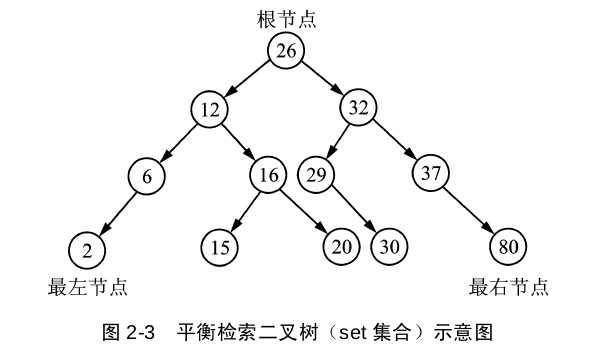
multiset,与set不同之处就是它允许有重复的键值。
正反遍历,迭代器iterator、reverse_iterator

1 #include<iostream> 2 #include<set> 3 4 using namespace std; 5 6 int main() 7 { 8 set<int> v; 9 v.insert(1); 10 v.insert(3); 11 v.insert(5); 12 v.insert(2); 13 v.insert(4); 14 v.insert(3); 15 16 //中序遍历 升序遍历 17 for(set<int>::iterator it = v.begin(); it != v.end(); ++it) 18 { 19 cout << *it << " "; 20 } 21 cout << endl; 22 23 for(set<int>::reverse_iterator rit = v.rbegin(); rit != v.rend(); ++rit) 24 { 25 cout << *rit << " "; 26 } 27 cout << endl; 28 29 return 0; 30 }

自定义比较函数,insert的时候,set会使用默认的比较函数(升序),很多情况下需要自己编写比较函数。
1、如果元素不是结构体,可以编写比较函数,下面这个例子是用降序排列的(和上例插入数据相同):

1 #include<iostream> 2 #include<set> 3 4 using namespace std; 5 6 struct Comp 7 { 8 //重载() 9 bool operator()(const int &a, const int &b) 10 { 11 return a > b; 12 } 13 }; 14 int main() 15 { 16 set<int,Comp> v; 17 v.insert(1); 18 v.insert(3); 19 v.insert(5); 20 v.insert(2); 21 v.insert(4); 22 v.insert(3); 23 24 for(set<int,Comp>::iterator it = v.begin(); it != v.end(); ++it) 25 { 26 cout << *it << " "; 27 } 28 cout << endl; 29 30 for(set<int,Comp>::reverse_iterator rit = v.rbegin(); rit != v.rend(); ++rit) 31 { 32 cout << *rit << " "; 33 } 34 cout << endl; 35 36 return 0; 37 }

2、元素本身就是结构体,直接把比较函数写在结构体内部,下面的例子依然降序:

1 #include<iostream> 2 #include<set> 3 #include<string> 4 5 using namespace std; 6 7 struct Info 8 { 9 string name; 10 double score; 11 12 //重载 < 13 bool operator < (const Info &a) const 14 { 15 return a.score < score; 16 } 17 }; 18 int main() 19 { 20 set<Info> s; 21 Info info; 22 23 info.name = "abc"; 24 info.score = 123.3; 25 s.insert(info); 26 27 info.name = "EDF"; 28 info.score = -23.53; 29 s.insert(info); 30 31 32 info.name = "xyz"; 33 info.score = 73.3; 34 s.insert(info); 35 36 for(set<Info>::iterator it = s.begin(); it != s.end(); ++it) 37 { 38 cout << (*it).name << ":" << (*it).score << endl; 39 } 40 cout << endl; 41 42 for(set<Info>::reverse_iterator rit = s.rbegin(); rit != s.rend(); ++rit) 43 { 44 cout << (*rit).name << ":" << (*rit).score << endl; 45 } 46 cout << endl; 47 48 return 0; 49 }
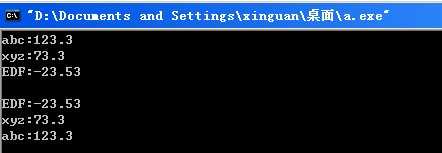
multiset与set的不同之处就是key可以重复,以及erase(key)的时候会删除multiset里面所有的key并且返回删除的个数。
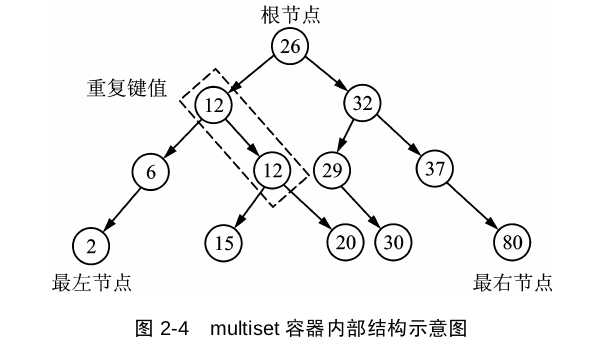
map
map也是使用红黑树,他是一个键值对(key:value映射),便利时依然默认按照key程序的方式遍历,同set。
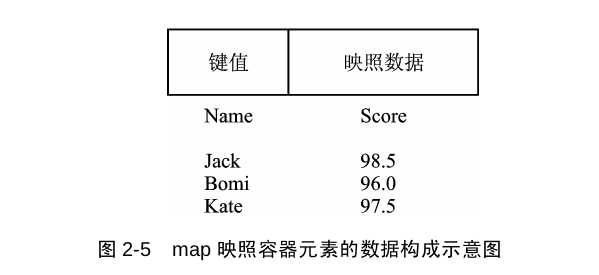

1 #include<iostream> 2 #include<map> 3 #include<string> 4 5 using namespace std; 6 7 int main() 8 { 9 map<string,double> m; 10 11 //声明即插入 12 m["li"] = 123.4; 13 m["wang"] = 23.1; 14 m["zhang"] = -21.9; 15 m["abc"] = 12.1; 16 for(map<string,double>::iterator it = m.begin(); it != m.end(); ++it) 17 { 18 //first --> key second --> value 19 cout << (*it).first << ":" << (*it).second << endl; 20 } 21 cout << endl; 22 return 0; 23 }

用map实现数字分离
string --> number
之前用string进行过数字分离,现在使用map

1 #include<iostream> 2 #include<map> 3 #include<string> 4 5 using namespace std; 6 7 int main() 8 { 9 map<char,int> m; 10 11 m[‘0‘] = 0; 12 m[‘1‘] = 1; 13 m[‘2‘] = 2; 14 m[‘3‘] = 3; 15 m[‘4‘] = 4; 16 m[‘5‘] = 5; 17 m[‘6‘] = 6; 18 m[‘7‘] = 7; 19 m[‘8‘] = 8; 20 m[‘9‘] = 9; 21 /* 22 等价于 23 for(int i = 0; i < 10; ++i) 24 { 25 m[‘0‘ + i] = i; 26 } 27 */ 28 29 string sa; 30 sa = "9876543210"; 31 int sum = 0; 32 for( int i = 0; i < sa.length(); ++i) 33 { 34 sum += m[sa[i]]; 35 } 36 cout << sum << endl; 37 return 0; 38 }

number --> string


multimap
multimap由于允许有重复的元素,所以元素插入、删除、查找都与map不同。
插入insert(pair<a,b>(value1,value2))

1 #include <iostream> 2 #include <map> 3 #include <string> 4 5 using namespace std; 6 7 int main() 8 { 9 multimap<string,double> m; 10 11 m.insert(pair<string,double>("Abc",123.2)); 12 m.insert(pair<string,double>("Abc",123.2)); 13 m.insert(pair<string,double>("xyz",-43.2)); 14 m.insert(pair<string,double>("dew",43.2)); 15 16 for(multimap<string,double>::iterator it = m.begin(); it != m.end(); ++it ) 17 { 18 cout << (*it).first << ":" << (*it).second << endl; 19 } 20 cout << endl; 21 22 return 0; 23 }

至于删除和查找,erase(key)会删除掉所有key的map,查找find(key)返回第一个key的迭代器
deque
deque和vector一样,采用线性表,与vector唯一不同的是,deque采用的分块的线性存储结构,每块大小一般为512字节,称为一个deque块,所有的deque块使用一个Map块进行管理,每个map数据项记录各个deque块的首地址,这样以来,deque块在头部和尾部都可已插入和删除元素,而不需要移动其它元素。使用push_back()方法在尾部插入元素,使用push_front()方法在首部插入元素,使用insert()方法在中间插入元素。一般来说,当考虑容器元素的内存分配策略和操作的性能时,deque相对vectore更有优势。(下面这个图,我感觉Map块就是一个list< map<deque名字,deque地址> >)
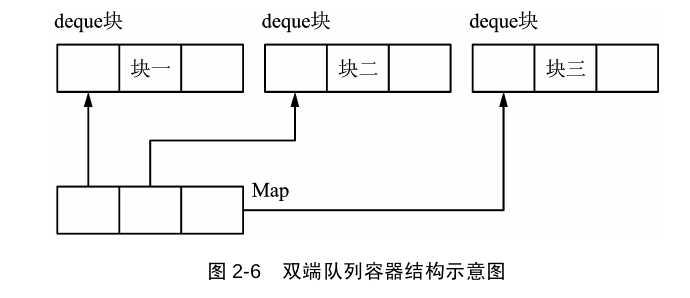
插入删除
遍历当然可以使用下标遍历,在这里使用迭代器。

1 #include <iostream> 2 #include <deque> 3 4 using namespace std; 5 6 int main() 7 { 8 deque<int> d; 9 10 //尾部插入 11 d.push_back(1); 12 d.push_back(3); 13 d.push_back(2); 14 for(deque<int>::iterator it = d.begin(); it != d.end(); ++it ) 15 { 16 cout << (*it) << " "; 17 } 18 cout << endl << endl; 19 20 //头部插入 21 d.push_front(10); 22 d.push_front(-23); 23 for(deque<int>::iterator it = d.begin(); it != d.end(); ++it ) 24 { 25 cout << (*it) << " "; 26 } 27 cout << endl << endl; 28 29 d.insert(d.begin() + 2,9999); 30 for(deque<int>::iterator it = d.begin(); it != d.end(); ++it ) 31 { 32 cout << (*it) << " "; 33 } 34 cout << endl << endl; 35 36 //反方向遍历 37 for(deque<int>::reverse_iterator rit = d.rbegin(); rit != d.rend(); ++rit ) 38 { 39 cout << (*rit) << " "; 40 } 41 cout << endl << endl; 42 43 //删除元素pop pop_front从头部删除元素 pop_back从尾部删除元素 erase中间删除 clear全删 44 d.clear(); 45 d.push_back(1); 46 d.push_back(2); 47 d.push_back(3); 48 d.push_back(4); 49 d.push_back(5); 50 d.push_back(6); 51 d.push_back(7); 52 d.push_back(8); 53 for(deque<int>::iterator it = d.begin(); it != d.end(); ++it ) 54 { 55 cout << (*it) << " "; 56 } 57 cout << endl; 58 59 d.pop_front(); 60 d.pop_front(); 61 for(deque<int>::iterator it = d.begin(); it != d.end(); ++it ) 62 { 63 cout << (*it) << " "; 64 } 65 cout << endl; 66 67 d.pop_back(); 68 d.pop_back(); 69 for(deque<int>::iterator it = d.begin(); it != d.end(); ++it ) 70 { 71 cout << (*it) << " "; 72 } 73 cout << endl; 74 75 d.erase(d.begin() + 1); 76 for(deque<int>::iterator it = d.begin(); it != d.end(); ++it ) 77 { 78 cout << (*it) << " "; 79 } 80 cout << endl; 81 return 0; 82 }
list
list<int> l
插入:push_back尾部,push_front头部,insert方法前往迭代器位置处插入元素,链表自动扩张,迭代器只能使用++--操作,不能用+n -n,因为元素不是物理相连的。
遍历:iterator和reverse_iterator正反遍历
删除:pop_front删除链表首元素;pop_back()删除链表尾部元素;erase(迭代器)删除迭代器位置的元素,注意只能使用++--到达想删除的位置;remove(key) 删除链表中所有key的元素,clear()清空链表。
查找:it = find(l.begin(),l.end(),key)
排序:l.sort()
删除连续重复元素:l.unique() 【2 8 1 1 1 5 1】 --> 【 2 8 1 5 1】
bitset
从来没用过,上两幅图吧就:
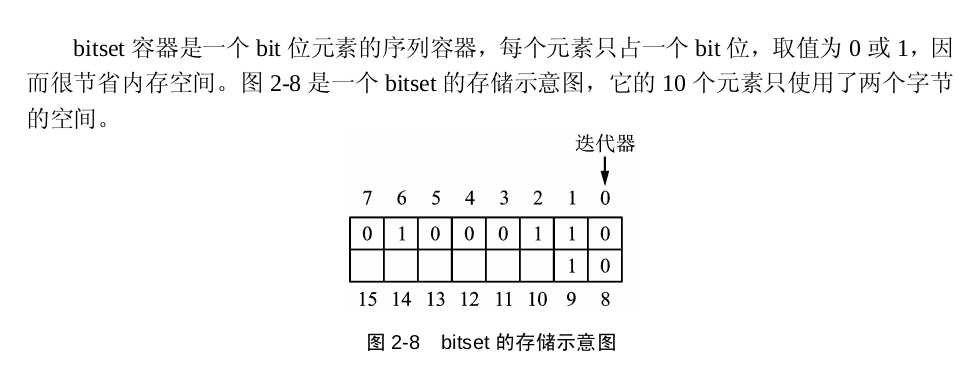
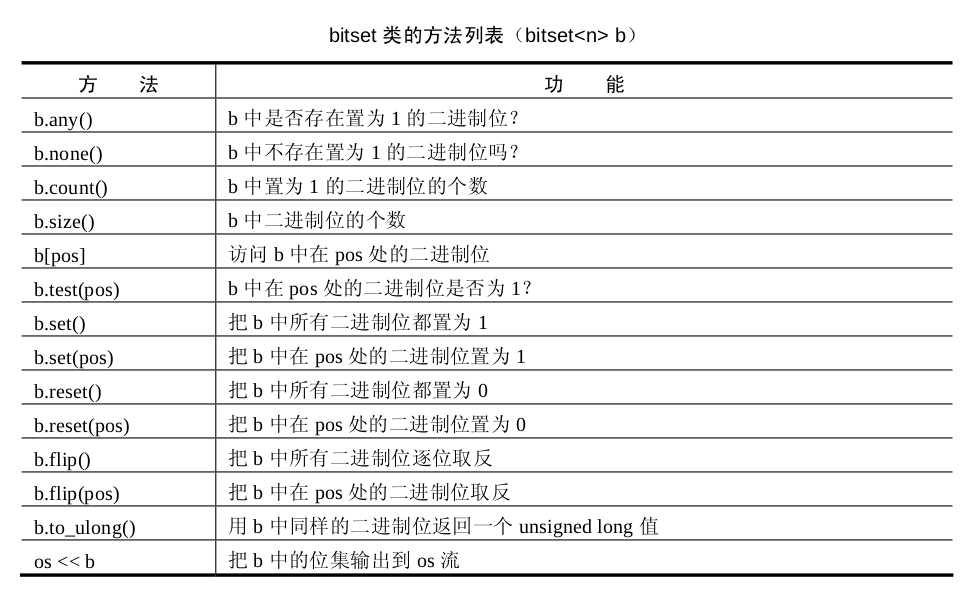
stack(后进先出)
这个印象深刻,学数据结构的时候做表达式求值的就是用的栈。
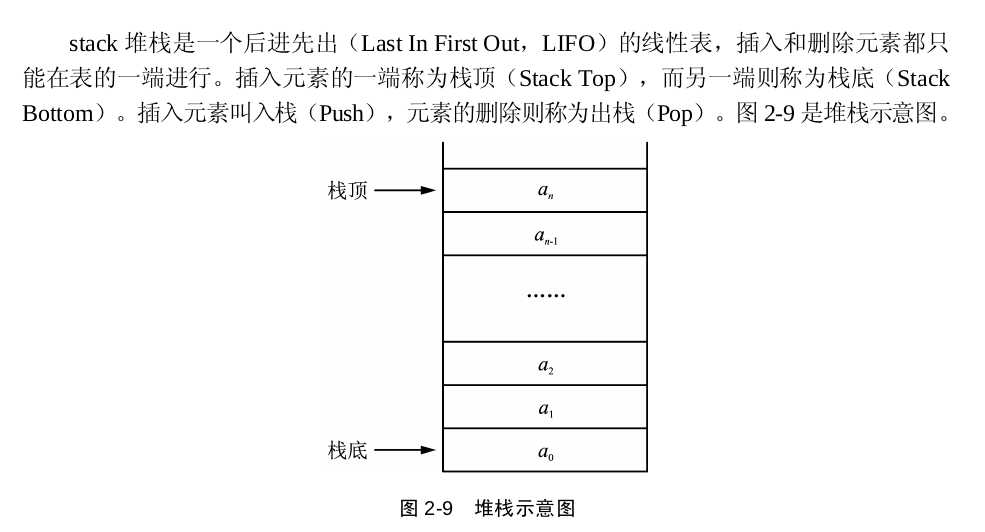

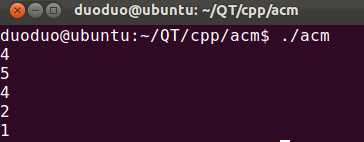
stack然我唯一费解之处在于,貌似它没有iterator,可以试试s.begin()编译器报错的。
queue(先进先出)

queue有入队push(插入)、出队pop(删除)、读取队首元素front、读取队尾元素back、empty,size这几种方法
priority_queue(最大元素先出)



1 #include <iostream> 2 #include <queue> 3 using namespace std; 4 5 int main() 6 { 7 8 priority_queue<int> pq; 9 10 pq.push(1); 11 pq.push(3); 12 pq.push(2); 13 pq.push(8); 14 pq.push(9); 15 pq.push(0); 16 17 cout << "size: " << pq.size() << endl; 18 19 while(pq.empty() != true) 20 { 21 cout << pq.top() << endl; 22 pq.pop(); 23 } 24 return 0; 25 }
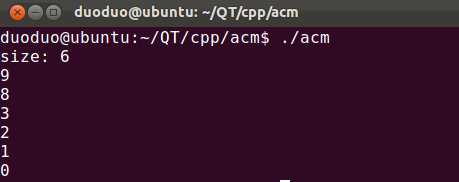
重载操作符同set重载操作符。
标签:
原文地址:http://www.cnblogs.com/HANYI7399/p/4338349.html